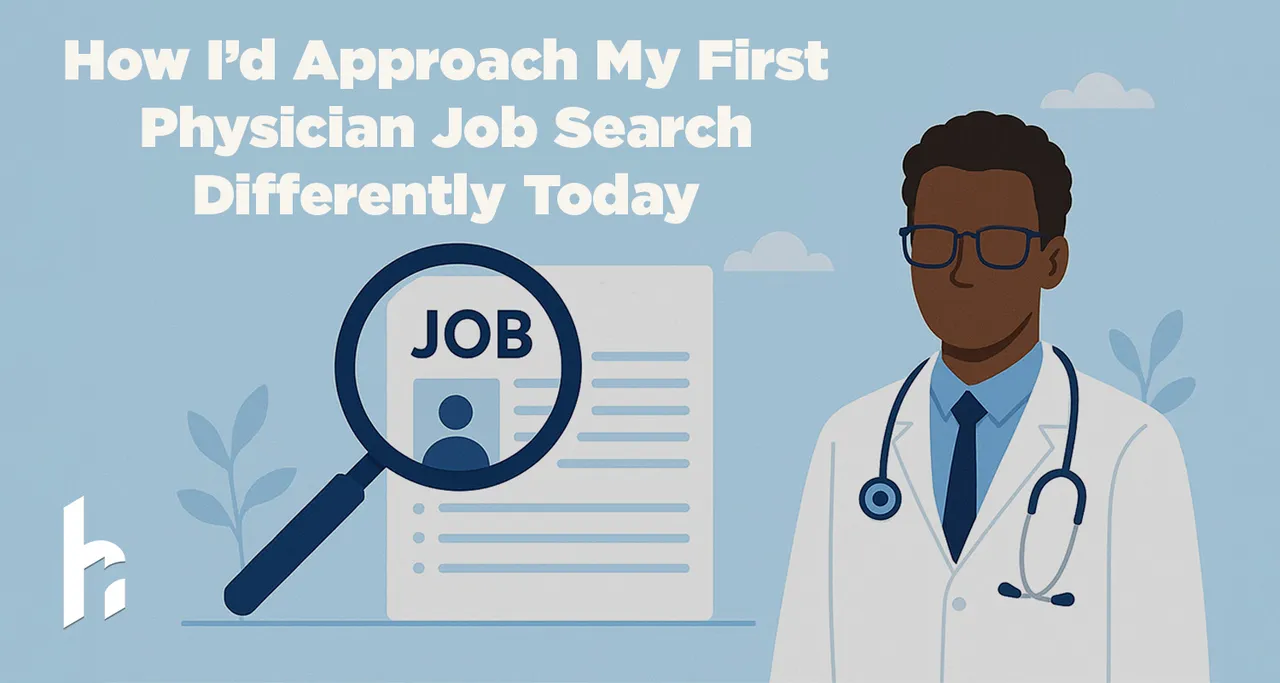How I’d Approach My First Physician Job Search Differently Today

Like most residents, I worked in many facilities by the time I graduated. I knew I liked some features of each hospital, but had a difficult time figuring out where I wanted to land my first job as an attending. As a result, I put my eggs in many baskets and spread myself out much more than I needed to.
Fifteen years later, I can see how I made the process harder than it needed to be. Below are some key questions I would have asked myself, and things I’d advise new graduates to consider before they sign their first contract.
What Lifestyle Do You Want?
As a graduating resident, I thought that I needed to make money, repay debt, and get started in life. I thought that if I had the money, I could pick the lifestyle. This, it turns out, was backward.
My questions should have focused on how I wanted to live. How much do I want to work? How much do I want to go on vacation? What do I want my life to look like—married, with children? What non-medical goals do I have?
Though it’s impossible to know these things precisely, it is very possible to get a sense of the direction you want to go and how much freedom you need to feel content.
The greater clarity you have, the easier it becomes to figure out the type of facility or position that aligns best with your goals. If the position you’re considering doesn’t allow you to develop in the ways you need, you’re not going to be happy.
How Much Money Do You Actually Need?
Need.
By the time you’re nearing the end of residency, you will be able to predict your budget with some degree of accuracy—whether you’re getting married, having children, your student loan debt, whether you’re moving, the type of place you’re moving to, or how much you’ll need to retire.
Once you weigh this information, you can predict how much money you need to make to achieve your goals. And once you know that, you know how much you need to work and what types of facilities or contracts to look for.
If finances aren’t your strong suit, there are a number of online resources or any CPA who can help you develop a budget.
It’s tempting to come out of residency and make as much as you can, thinking that you’ll “get ahead of it,” pay back loans, and then cut back.
But here’s the thing: You won’t. Because the more you make, the more you spend.
For example—even if you figure out that you need $100K/year but take a contract that pays $200K/year, you will wind up living a $200K/year lifestyle. That means a bigger house or car, investments, vacations, etc. You aren’t going to make an extra $100K/year and just watch it in a bank account.
Then, after a time of working more than you need to, you may find that you don’t want to work as much. However, you’re now accustomed to a $200K/year lifestyle and want to decrease to a $100K/year lifestyle. That’s a huge lifestyle change. If you have a family depending on your income, it’s even harder to achieve.
Being accustomed to more than you need makes lifestyle change challenging, but it makes career change even more difficult. If you decide to leave medicine, finding an alternative that doesn’t require a tremendous pay cut is nearly impossible.
Make what you need to, and work extra only if doing so has a purpose.
Academics, Community, or Both?
This was a major branch point in my initial job hunt.
Both paths have their plusses and minuses. The academic path had more options built into it, more facets for my career to develop into, and possibly more security. It also meant less money and that I would effectively have a 24/7 job.
The community meant more money but in a metrics-driven environment that would be more likely to lead to burnout sooner in life.
But then there were some contracts available with systems that had both options—a main academic focus but with some time in community settings.
I opted for a path with separate academic and community contracts. While this allowed some flexibility and security, it also gave me multiple masters. And trying to satisfy multiple masters meant that personal time would be perpetually squeezed until I could hone down the demands of one or the other.
If I could go back, I would tell myself a few things: one, that you can’t have your cake and eat it too, even if you do work twice as much as you need to; two, that both options will always be open, and there’s no reason you can’t try one and then switch if it isn’t working; and three, to develop clarity around what you want your non-job life to look like first, and then build a career around that rather than the other way around.
Choosing the Right Type of Facility
As you leave residency, you’ll have the sense of what type of facility suits you best.
Working in large, academic tertiary care centers offers a different life than working in rural, critical access hospitals. Federal hospitals like the VA are a different feel altogether. Do you like having every sub-specialist available all the time? Or do you like being the only doc for miles?
The type of patients and payor mix are also critical considerations. Do you like the underserved rural? The underserved urban? Or do you prefer a wealthy patient population who is very well connected, with high health literacy? Maybe a patient population that is largely comprised of skilled workers and laborers is the one you identify most with.
In reflection, I would tell myself to prioritize the patients over the facility and to focus on treating patient populations that I identify with most strongly. It has since been my experience that the reward of medicine is greater when I can connect with patients and help them in the ways they find most beneficial.
Location Is More Than the Facility
This sounds obvious—like obvious advice. But when picking a location, try to consider as many aspects of life as you are able.
By way of example, I live in a city that has a lot to offer but also has a lot of crime and schooling issues. As my family grew, we considered moving to another city that has a lower cost of living and reportedly less crime. Rather than just take a job and move there, I found a locums position in the region and worked there for three months.
During that time, I had the chance to learn about the new city from people who live in it. I learned that the cost of living was actually very misleading because the lower-cost areas are so because of disproportionately higher crime. I would wind up paying as much as I was already to live in the safer areas. I also learned that though they have better public schools, the schools are considered lower quality, and all the people I worked with sent their kids to private schools. Many were considering moving from this city for the same reasons I was considering moving from my city.
My advice to my earlier self would be to take a broader view of the cities offering jobs. Many are attractive and have great reputations, but when you start to consider the day-to-day life of those cities, they take on a different look.
Talk to the People Who Already Work There
Networking is not easy or fun, but it’s necessary.
Between the many social media outlets and word of mouth, you can usually connect with someone who works at a facility you’re considering joining. When you expand your search to include people in other specialties or disciplines, networking becomes even easier. Medicine tends to be a very small world.
If this is not possible, and if your schedule allows, consider working locums in an area before committing. Even if you cannot work at the specific facility you’re interested in, if you work in a nearby facility, you can either get information or make connections without committing to a move.
Final Thoughts
There is an excellent chance that your first job as an attending will not be your only or last job. If I were starting again, I would keep this in mind as I took time to figure out what I really wanted out of my career. I would budget early and work only that much. I would take advantage of networks and locums opportunities, and I would work toward a balanced life rather than a paycheck.
Related Posts
